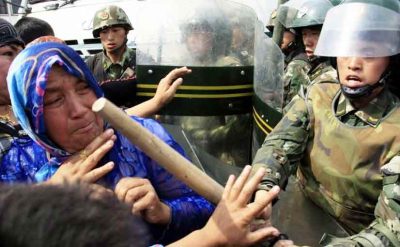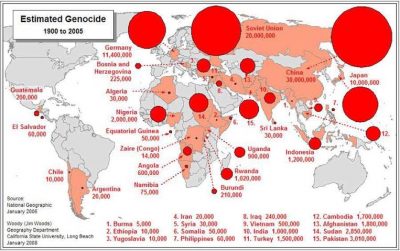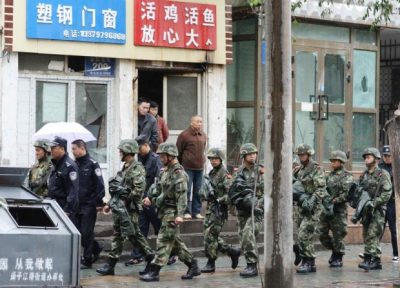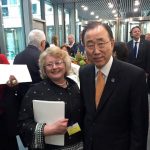Guang Niu
By
Cynthia M. Lardner
Genocide and ethnic cleansing, forms of Scientific Racism, have been around since the beginning of time. Since the Holocaust, various conventions and treaties have been entered into making genocide a crime and ethnic cleansing a crime against humanity. International tribunals have been created, at great expense, to acknowledge the harm done, to redress the wrongs of millions of victims, to provide reparations, and to act as a deterrent. Despite a more concerted international effort, genocide and ethnic cleansing remain endemic global problems.
There are many reasons why genocide and ethnic cleansing need to be addressed. First, it is important to remember the past. Second, recognition means support for universal values of human dignity, as well as democracy and the rule of law. Third, recognition acknowledges the legacy of massive abuses, the annihilation of ethnic groups, and the tragic loss of life. Last, it opens the door for learning from the past in order to deter future abuses.
As Kofi Annan, Nobel Peace Prize Laureate and the Seventh Secretary-General of the United Nations, stated, “It takes courage to address the rights of victims genuinely, but it is fundamental to heal wounds permanently. In a world riddled with conflict, this courage will be more essential than ever. The international community needs to do more to support countries through this often difficult process.”
Genocide Defined
The term “genocide” came into existence in 1944 when a Polish-Jewish lawyer, Raphael Lemkin, described Nazi policies of systematic murder by combining geno-, the Greek word for race or tribe, with -cide, the Latin word for killing. Genocide is a very specific term, referring to violent crimes committed against groups with the intent to destroy the existence of the group.
Genocide first became a crime on January 12, 1951 when the United Nations Convention on the Prevention and Punishment of the Crime of Genocide entered into force. Article 2 of the Convention defines “…Genocide as any of the following acts committed with intent to destroy, in whole or in part, a national, ethnic, racial or religious group:
(a) Killing its members;
(b) Causing serious bodily or mental harm to members of the group;
(c) Deliberately inflicting on the group conditions of life calculated to bring about its physical destruction in whole or in part;
(d) Imposing measures intended to prevent births within the group;
(e) Forcibly transferring children of the group to another group.”
The same definition is used in Article II of the Rome Statute upon which the ICC was founded.
Ethnic Cleansing Defined
“Ethnic Cleansing is related to Genocide, but Ethnic Cleansing is focused more closely than Genocide on geography and on forced removal of ethnic or related groups from particular areas. The greatest overlap between Ethnic Cleansing and Genocide takes place when forced removal of population leads to a group’s destruction. Ethnic Cleansing is often a policy carried out by strong states to mould the population map, especially of border zones, but the breakup of such states also generates power struggles that can lead to Ethnic Cleansing. Another paradox is that partition or division of ethnically or religiously mixed states has been identified both as a cause of Ethnic Cleansing and as a possible remedy for Ethnic Cleansing,” explained Benjamin Lieberman, a professor of Economics, History, and Political Science.
Crimes against humanity, such as ethnic cleansing, are distinct from genocide and not limited to war time conflicts. The primary difference is that crimes against humanity, such as ethnic cleansing protect the individual while the crime of genocide protects a group.
Ethnic cleansing has been a crime against humanity since 1945. The August 8, 1945 Charter of the International Military Tribunal – Annex to the Agreement for the prosecution and punishment of the major war criminals of the European Axis, commonly referred to as the Nuremberg Charter, in Article 6 defined “crimes against humanity” as including “murder, extermination, enslavement, deportation, and other inhumane acts committed against any civilian population, before or during a war.”
Article 49 of the Fourth Geneva Convention, involving international conflicts, came into being in 1949, forbidding “individual or mass forcible transfers, as well as deportations of protected persons from occupied territory to the territory of the Occupying Power or to that of any other country.” Protocol II of 1977 extended this rule to civilians in internal armed conflicts.
Under Article 7 of the Rome Statute a “‘crime against humanity’ is defined an act when committed as part of a widespread or systematic attack directed against any civilian population, with knowledge of the attack”. Article 7 expands the definition to include the “’Deportation or forcible transfer of population’s means, forced displacement of the persons concerned by expulsion or other coercive acts from the area in which they are lawfully present, without grounds permitted under international law.”
Ongoing Situations
According to the UN Special Advisor on the Prevention of Genocide issues to be evaluated as to whether Genocide has occurred include:
-
Acts that could be obvious “elements” of the crime of Genocide as defined in Article 6 of the Rome Statute, such as killings, abduction and disappearances, torture, rape and sexual violence; ‘Ethnic Cleansing’ or pogroms;
-
Less obvious methods of destruction, such as the deliberate deprivation of resources needed for the group’s physical survival and which are available to the rest of the population, such as clean water, food and medical services;
-
Creation of circumstances that could lead to a slow death, such as lack of proper housing, clothing and hygiene or excessive work or physical exertion;
-
Programs intended to prevent procreation, including involuntary sterilization, forced abortion, prohibition of marriage and long-term separation of men and women;
-
Forcible transfer of children, imposed by direct force or through fear of violence, duress, detention, psychological oppression or other methods of coercion;
-
Death threats or ill treatment that causes disfigurement or injury; forced or coerced use of drugs or other treatment that damages health.
Genocide Watch maintain three lists; Genocide Emergency, declared when genocide is actually underway; Genocide Warning, called when politicide or genocide is imminent, often indicated by widespread massacres; and a Genocide Watch, when early warning signs indicate a probability of mass killing or genocide.
Presently, there are five countries on Genocide Emergency list; Syria, Sudan, the DRC, Ethiopia, and Burma/Myanmar. Six countries are on the Genocide Warning list; Nigeria, Chad, Equatorial Guinea, Yemen, Kenya, and the Central African Republic. Nine countries are on the Watch list; Côte d’Ivoire, Uzbekistan, Burundi, Iran, Sri Lanka, Mali, South Africa, India, Angola.
Oddly, Genocide Watch failed to mention the ongoing situations in the People’s Republic of China, Turkey, and Israel.
China
It is the situation in China that has long escaped any international accountability; a status that, unfortunately, will likely continue.
The 2005 White Paper on Regional Autonomy for Ethnic Minorities in China states:
In China regional autonomy for ethnic minorities is a basic policy adopted by the Chinese government in line with the actual conditions of China, and also an important part of the political system of China. Regional autonomy for ethnic minorities means that under the unified leadership of the state regional autonomy is practiced in areas where people of ethnic minorities live in concentrated communities.
“[T]here is an edge to the message. Stability and vigilance against any inkling of separatism are mantras of Beijing’s one-party authoritarian state. Religion — particularly the Buddhism of Tibetans and the Islam of Uighurs in the neighboring restive region of Xinjiang — have long posed an implicit threat to Communist party ideology. Chen’s [Quanguo, Tibet’s Communist Party boss] insistence on reverence for “scientific culture” is Beijing’s way of saying minority religious practices need to be better controlled. Last year, in remarks addressing counterterrorism measures, Chinese President Xi Jinping insisted “patriotic clergy” in Xinjiang should help their co-religionists “adapt to a socialist society,” opined foreign policy commentator Ishaan Tharoor.
China has engaged in genocide and ethnic cleansing of Muslims, especially those not of Levant descent, in the Xinjiang Uighur Autonomous Region. Following the bloodiest massacre in the region, which the Chinese called a ‘war on terrorism’:
President Xi Jinping urged all ethnic groups in Xinjiang to “show mutual understanding, respect, tolerance and appreciation among themselves, and learn and help each other,” so that they could be united together “like seeds of a pomegranate.” The more separatists attempt to sabotage our ethnic unity, the more we should try to reinforce it,” the president said, adding that unity is the “lifeline” for people of all ethnic backgrounds (Emphasis Added).
Paramilitary policemen patrol past a building with broken windows after an explosion in Urumqi, in the Xinjiang Uighur Autonomous Region, in this photo taken May 22, 2014 (REUTERS/Kyodo).
Levant descent refers to the region of origin. Heralding originally from a large geographical area, including the tip of the Arabian Peninsula, they subscribe to many religious ideologies, including Islam and Judaism. Individuals not of Levant descent are the same population targeted in Turkey by President Recep Tayyip Erdogan, by Russia in Ukraine, and by ISIS around the world.
This was followed by a Chinese ban on the wearing of burqas and on growing of lengthy beards. Families in the region must sign “de-radicalization pledges” and are obligated to report on each other.
In addition, China’s persecution of the Tibetan population by both genocide and ethnic cleansing has been in the headlines for decades. The international community has been precluded from acting due to China’s lack of accountability and, for some governments, out of fear of economic reprisal by the Chinese government.
Rather than address the rampant genocide and ethnic cleansing in Tibet and Xinjiang, the Chinese government blames the United States these crimes stating it interfered with its internal policies “under the guise of promoting democracy, human rights, and religious freedom.”
“The Chinese government tends to politicize the ethnic issue, “categorizing all everyday grievances as evidence of Xinjiang or Tibetan separatism and attributing all social problems which are the result of policy failure to Western intervention,”” stated Ma Rong of Peking University.
Even though China, a P5 member, is not a party to the Rome Statute, the UNSC can refer situations in which one or more such crimes appears to have been committed in any State to the OTP under Chapter VII of the Charter of the United Nations. This will never transpire as Russia and China would veto any resolution. Thus, China remains free to do whatever it pleases no matter how egregious the human rights violations.
The Refugee Crisis
One instance that may test the resolve of the international criminal justice systems is the dire refugee crisis. Over 60 million people having been displaced as a result of armed conflict, most of whom are living in abhorrent conditions in countries in Europe to Australia, and whose rights have been violated under the Convention Relating to the Status of Refugees; the Geneva Conventions of 1949, the most relevant of which is the Fourth Geneva Convention; the Rome Statute of the International Criminal Court; and the International Declaration of Human Rights. There is also the doctrine of Responsibility to Protect.
On June 28, 2016, speaking at The Hague Centre for Global Justice, Dr. Lloyd Axworthy, former Canadian Foreign Minister, stated that, “The refugee crisis is being treated with indifference” placing “human rights in a position of limbo.” His comments mirror the warning issued by Union Nations Secretary-General Ban Ki-moon and International Committee of the Red Cross President Peter Mauer on October 31, 2015, international governance will “condemn those who violate international humanitarian law.”
Conclusion
“The crimes of all crimes in international law are crimes of jus cogens such as genocide, war crimes and crimes against humanity. The basis of these crimes stem from one and one thing only-racism and hate. Therefore, international law’s reliance on the use of force in restoring and maintaining international peace and security to prevent jus cogens crimes is unsustainable without the main focus being on compulsory anti-racism education,” stated Ahmad Moussa, a professor in the Kurdistan region of Iraq.
The author with United Nation Secretary-General Ban Ki-moon at the inauguration of the new ICC complex on April 19, 2016
Cynthia M. Lardner
Cynthia M. Lardner is a journalist focusing on geopolitics. An ardent supporter of criminal justice, Ms. Lardner is a contributing editor for Tuck Magazine and E – The Magazine for Today’s Executive Female Executive, and her blogs are read in over 37 countries. As a thought leader in the area of foreign policy, her philosophy is to collectively influence conscious global thinking. Ms. Lardner holds degrees in journalism, law, and counseling psychology.





No Comments Yet!
You can be first to comment this post!